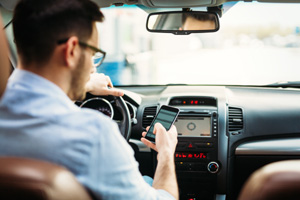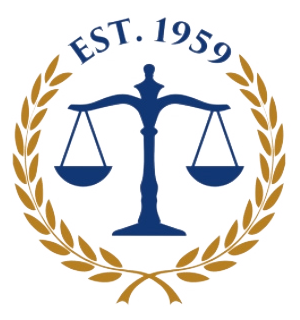
By now, you probably know that it is illegal to text while driving in addition to being simply dangerous and irresponsible. But once you pull to a stop, usually at a stoplight, is it legal to go ahead and whip out your phone for a quick message? This question puts a spotlight on the legal implications and safety concerns of texting at a stoplight, drawing attention to the critical aspects of this issue. After all, if you aren’t able to use your phone while driving, how can you respond quickly to messages or check for important updates about where you are going? Additionally, searching through text messages on an iPhone can be cumbersome and may have limitations, further complicating the situation.
If you’ve ever wondered, “Can I text at a stoplight?” We can help you understand the legal implications and safety concerns of this common practice. At Byrd Davis Alden & Henrichson LLP, we are dedicated to supporting victims in need. If you have noticed someone doing something unsafe and this has resulted in injuries, we can help you take action and receive justice. We encourage you to contact us for support during your car accident claim.
Distracted Driving Laws Vary by State
Texting while driving is illegal under the grounds that it is distracted driving. In some states, texting while driving is prohibited under this general law. In Austin, there is a specific ordinance enacted by lawmakers to strictly prohibit texting while driving.
Though it is not a state law, the practice has been adopted by most major cities in Texas. This may mean, depending on the jurisdiction, it may be illegal to interact with the dropdown menu, messages app, links, and other features on your phone at a stoplight.
Text Messages at Stoplight May Be Legal or a Legal Gray Area
While it is clear that texting while driving is illegal, including on devices such as iPhones, the laws on texting while stopped at a stoplight are slightly trickier, especially when it comes to searching within text messages and the limitations related to searching through text messages on an iPhone, and this may not be considered while driving for the purposes of the distracted driving laws.
Texting Laws in Different States
For example, Florida has a specific law that states that motor vehicles stationed at lights that are stopped are not being operated and are thus not subject to the texting-while-driving ban. This exclusion allows texting while stopped at red lights, in traffic jams, or to report criminal activity.
California treats the law completely differently, stating that it is not acceptable to check email or read text messages while at stop lights or in bumper to bumper traffic. The California law specifies that a person shall not drive a motor vehicle while using a phone unless it is hands free, and this definition applies to drivers even when they are stopped.
For those interested in exploring more detailed information on their state’s texting and driving laws, utilizing the spotlight search feature on your mobile device can be an efficient way to find specific legal texts and guidelines.
Our Recommendation for Smartphone Use on the Road
Even in areas that have stoplight loopholes and do not restrict texting while driving, if stopped, any time you are distracted by your phone and cause a distraction to other drivers or impede normal traffic, you can be cited for distracted or even reckless driving.
So if you cause a dangerous condition to other drivers, even by not moving forward on a green light, you can be charged if an officer sees you or if an accident results.
The best bet for protection from legal consequences and safety risks is to put down your phone when at a light or any time you drive. If you are the user of a vehicle, you will want to avoid checking your personal devices whether moving or otherwise stopped. Call Byrd Davis Alden & Henrichson LLP if you have any other questions regarding texting while driving laws and how to avoid being ticketed for this behavior. Our Austin car accident attorneys offer free consultations.
Examples of Other Smartphone Use That May Be Illegal
Depending on the jurisdiction of an accident or citation, additional interactions on your personal devices may be illegal. We encourage you to be wary if you want to do any of the following on your devices:
- Navigate the home screen
- Browse or search the internet
- Answer emergency text messages
- Access or edit a note you’ve written
- Alter your display
- Open new apps
- Share or open a link
- Answer the phone
- Scroll through a browser page
Additionally, using ‘spotlight search’ to sift through text messages or other content on your device while stopped might seem harmless but could still pose legal risks. This is especially true for iPhone users, as searching through text messages on an iPhone can have limitations and may still be considered illegal in some jurisdictions.
While there are some Apple, Android, and other electronic devices that have created safer ways to participate in these distractions and displays, there is still risk involved. If you are ever unsure about what local laws permit, we encourage you to exercise caution.
Additionally, even if jurisdiction allows you to use your phone in some cases, you should use your best judgment to determine if it is safe. Some individuals are aware that it is unwise to use their phones in any circumstances because of various circumstances, and you should not ignore these facts just because the laws allow it.
If you have any questions about how these phone laws might impact a personal injury claim, such as a car accident resulting in serious injuries, you can give us a call. An attorney from Byrd Davis Alden & Henrichson LLP can help you determine if someone was acting negligently, determine whether you can collect compensation and much more.
How Can a Lawyer Help With a Distracted Driving Accident Claim?
When you’ve been in an accident resulting in serious injuries, including a distracted driving accident caused by someone texting on the road, you may want to take legal action. The texting individual may be liable for any losses you face, including medical bills, court fees, and more.
But when you want to take legal action of any kind, we encourage you to work with a lawyer. By retaining support from an attorney at Byrd Davis Alden & Henrichson LLP, you can receive outstanding support in the following areas:
- Conduct an independent investigation into the accident
- Negotiate with every party to recover a satisfactory settlement
- Assure that all documents are filed correctly and in a timely manner
- Review your damages to determine the total value of your claim
- Communicate with the other parties on your behalf
- Work with your healthcare providers to obtain any missing records
- Organize and present the evidence in order to prove liability and damages
- Quicker delivery of documents from law enforcement and doctors
- An understanding of the legal system and how to make it work for you
We encourage you to refrain from representing yourself during legal matters of any kind, especially if you are healing from serious injuries. Texting and distracted drivers can cause serious harm, and self-representation may result in less compensation than you require to make a full recovery. But when you work with an attorney from Byrd Davis Alden & Henrichson LLP, we can help reduce stress, shorten litigation time, and maximize compensation on your behalf.
Hold Distracted Drivers Accountable: Contact Byrd Davis Alden & Henrichson LLP for Support After a Car Accident
At Byrd Davis Alden & Henrichson, LLP, we can help you handle your distracted driving accident claim and get the compensation you need. Our experienced team is dedicated to handling personal injury cases, including those involving texting or using phones irresponsibly on the road. If you’ve been involved in an accident due to texting and driving, we can provide the legal support you need to navigate your case.
Contact Byrd Davis Alden & Henrichson LLP today to schedule a consultation and learn more about your rights. Call us at (512) 454-3751 or complete our contact form to schedule your free, no-obligation consultation and begin working on your claim. Our firm has an extensive history of bringing outstanding results to victims in need, and we can do the same for you.


